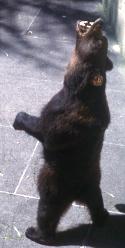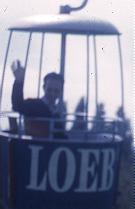 Although Frank Model, a classmate I first met in 1959 during my Freshman year at MIT, had been raised in New York City, his first language had actually been German (spoken by both his parents and grandparents). As a result, he would use German expressions from time to time, most notably, "Sehr gut" (which is pronounced sort of like "zare goot"). I spoke no German at the time, and one day I asked him what it meant. He explained that it simply meant "very good". I added it to my tiny German vocabulary, which up to that point probably included only ja, nein, and the numbers eins, zwei, and drei. Frank, by the way, took Elementary German as a Sophomore. This makes more sense than it might seem. Although he had learned the language as a child, he had stopped using it at some point, leaving him with a child's vocabulary, and no knowledge of the formal grammar. On the other hand, he no doubt also figured it would be an easy A. His professor, Herr Primus Benedict Bon, proclaimed him a "Ringer". I have my own story about Herr Bon, who gave me my oral exam for fluency in French. I wrote about that in entry #0026, Herr Bon. I also eventually studied German myself, and you can read about my introduction to German at MIT in entry #0013, Frau Pan. In the summer of 1961, when I was 19, I made my first trip to France. It was a language study trip with an organization called "Classrooms Abroad". I spent the summer in the city of Pau, in the south of France. We lived with French families, and spent our mornings studying French at the Université de Bordeau à Pau. During the afternoon, we were free to do whatever we wanted. It was this trip that awakened in me a lifetime love of France and the French language. A number of excellent excursions were arranged by the program during the summer, and at the end of the summer, I participated in an optional trip around the periphery of France, in a Volkswagen van. This took us at one point into Switzerland, and into the city of Bern, which is German speaking.
Bern had a nice public park, with an enclosure containing some bears, one of which is shown to the left. The city had supposedly been named originally after the bears that were found there. The German word for "bear" is "bär", which is pronounced just like the English word. Its plural is "bären". The spelling of the city's name is allegedly of old German origin. A number of excellent excursions were arranged by the program during the summer, and at the end of the summer, I participated in an optional trip around the periphery of France, in a Volkswagen van. This took us at one point into Switzerland, and into the city of Bern, which is German speaking.
Bern had a nice public park, with an enclosure containing some bears, one of which is shown to the left. The city had supposedly been named originally after the bears that were found there. The German word for "bear" is "bär", which is pronounced just like the English word. Its plural is "bären". The spelling of the city's name is allegedly of old German origin.
 There was also a cable-car ride that took you on an elevated circuit around a portion of the park. We all took that ride. At the end, a man held the car steady as we descended. As I got off, he looked me in the eye, and said: There was also a cable-car ride that took you on an elevated circuit around a portion of the park. We all took that ride. At the end, a man held the car steady as we descended. As I got off, he looked me in the eye, and said:
  |